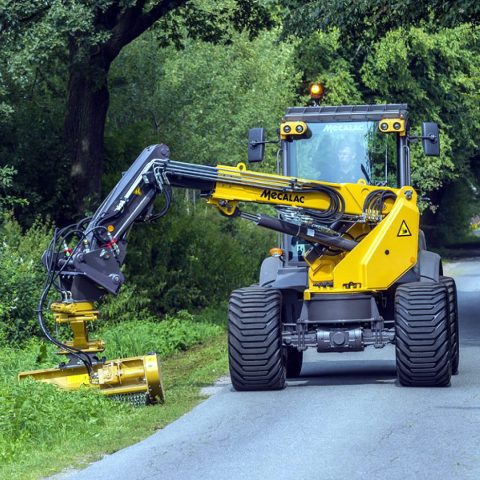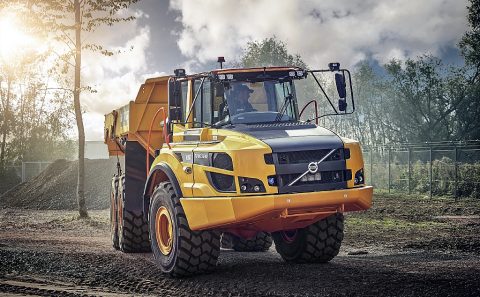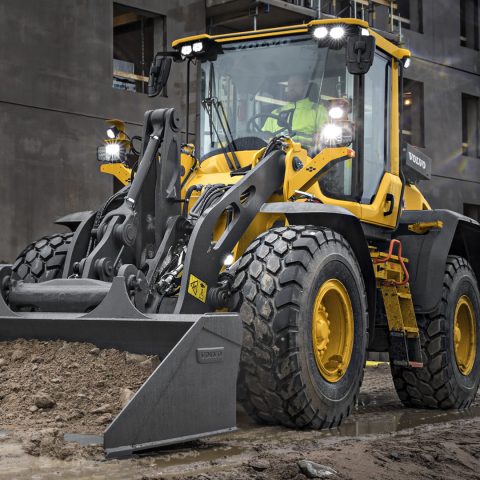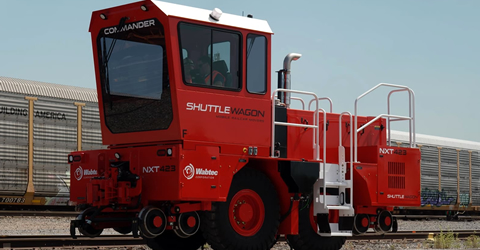Pros and Cons of Buying vs. Renting Heavy Equipment
If you own a construction business, having the right fleet of heavy equipment for the jobs you perform is critical. Due to the significant cost of these machines and the critical role they play in the success of your business, it’s important to be thoughtful about the ways in which you build up your fleet of heavy equipment.
One of the primary decisions you’ll need to make involves whether to buy or rent the heavy equipment you need. There are advantages and drawbacks to both options, and the right decision for your specific needs will depend on a variety of factors. The following overview will break down the pros and cons of buying and renting heavy equipment, as well as some of the most important factors that should influence your decision.
Pros of Buying Heavy Equipment
You’ll experience several important advantages when you buy your heavy equipment:
- Long-Term Savings – If you have regular projects that will require the same machinery, it is often more cost-effective in the long run to purchase the equipment. Repeated rentals of heavy equipment that your team uses frequently can add up and over time, it may result in a larger expenditure than would be required to buy the machine.
- No Usage Restrictions – When you own your heavy equipment, there are no restrictions on the amount of time it can be spent in use or what you use your equipment for. You’ll have complete control over how and when your heavy equipment is used.
- Customization – Owning your heavy equipment allows you to make modifications and customizations based on your specific applications. This ensures you can maximize the machine’s utility for the projects you take on.
- Immediate Availability – When you own your heavy equipment, it will always be available whenever you need it. There’s no risk that a project will be delayed due to lack of availability or scheduling conflicts with a rental, which can sometimes be an issue during peak season.
- Asset Value – Buying heavy equipment adds a valuable asset to your business. In the short term, this contributes to your company’s net worth. In the long term, it gives you the ability to recoup some of the purchase cost if you no longer need the equipment and decide to sell it.
- Potential Tax Benefits – Owning heavy equipment may provide tax benefits, such as the ability to claim deductions for depreciation value. Always consult with your tax professional to ensure you’re maximizing the allowable deductions associated with your equipment.
Cons of Buying Heavy Equipment
 There are also some potential disadvantages associated with buying heavy equipment:
There are also some potential disadvantages associated with buying heavy equipment:
- High Upfront Costs – Buying heavy equipment comes with a high initial upfront cost that can place a strain on your cash flow and limit your ability to allocate precious resources to other areas of your business. Even if you choose to finance your equipment, it will still often require a substantial down payment to minimize interest paid over the life of the loan and to avoid excessive monthly payments.
- Ongoing Maintenance and Repair Costs – When you own your heavy equipment, you’re taking full responsibility for all costs associated with ongoing maintenance and repairs. In the event of unexpected breakdowns, this can not only result in expensive repairs, but also downtime that can derail project timelines.
- Depreciation – As with all machinery, heavy equipment loses value over time. Depending on how long you keep your equipment and the condition it’s in at the time you’re ready to sell it, this depreciation may impact the amount of money you can recoup as part of the resale process.
- Storage and Transportation Responsibilities – Owning heavy equipment can create logistical headaches associated with securing proper storage and transportation to and from the work site. If you have to rent a storage facility, these costs must be added into the total costs associated with ownership.
Pros of Renting Heavy Equipment
In certain situations, renting heavy equipment may make more sense for your business than owning these machines. If you’re considering renting equipment, you can expect to experience the following benefits:
- Lower Initial Costs – Renting allows you to eliminate the high upfront costs associated with purchasing heavy equipment. This is especially attractive if your business has limited cash flow that may be better spent on other aspects of your operations.
- Flexibility – If your business doesn’t require the same equipment for every job, renting will provide you with greater flexibility, ensuring you have access to the specific machinery you need when you need it. This is especially important if you take on seasonal projects or occasionally require specialized equipment for one-off jobs.
- Eliminates Maintenance Costs – The responsibility for costs associated with ongoing maintenance and repairs typically falls on the rental company. This reduces operational headaches associated with costly breakdowns.
- Access to the Latest Technology – Most rental companies update their fleets on a regular basis. This ensures you’ll always have access to the latest models and most advanced technology.
- Easier Logistics – Logistical matters associated with storage and transportation are handled by the rental company, eliminating potential headaches for your business.
- Reduced Monthly Costs – You’ll avoid monthly costs associated with depreciation, storage and transportation which can eat into your profitability.
Cons of Renting Heavy Equipment
 Some potential disadvantages associated with renting your heavy equipment include:
Some potential disadvantages associated with renting your heavy equipment include:
- Higher Long-Term Costs – While renting heavy equipment is generally more cost effective for one-off projects or other short-term needs, it’s often more expensive if you plan on using machinery for regular jobs. Over an extended period of time, you may find that the cost of renting is higher than the cost of purchasing the equipment outright.
- Availability Issues – When you rent heavy equipment, you run the risk that the specific machinery you need isn’t available when you need it. This is especially common during peak season when rental fleets are typically in use all the time.
- Lack of Customization – When you rent heavy equipment, you must use the machinery as is. If you need to make modifications based on the needs of your specific projects, you may find that you lack the customization necessary to complete the job properly.
- Lack of Equity – Rental equipment doesn’t provide your business with an asset. You’re simply paying for the right to use the machine for a specified period of time. You won’t add equity to your business or be able to recoup some of these costs through resale at a later date.
- Potential for Idle Costs – If your project schedules change, you may be end up paying for equipment that sits unused during some of the rental period.
Factors to Consider When Deciding Whether to Buy or Rent Heavy Equipment
The pros and cons of each option are only part of the equation when determining whether to buy or rent heavy equipment. The following considerations should also be factored into your decision.
Frequency and Duration of Use
 The frequency of usage should be an important factor used to determine whether it’s better to rent or buy heavy equipment. If you need the equipment for a long-term project or will be able to use it regularly as part of multiple jobs you complete, it often makes more sense to buy the equipment since rental costs can become very expensive in this situation. Similarly, if you’re purchasing a multi-purpose machine such as a loader, excavator or dozer that can be used for many different types of projects, owning the equipment provides your business with a valuable asset.
The frequency of usage should be an important factor used to determine whether it’s better to rent or buy heavy equipment. If you need the equipment for a long-term project or will be able to use it regularly as part of multiple jobs you complete, it often makes more sense to buy the equipment since rental costs can become very expensive in this situation. Similarly, if you’re purchasing a multi-purpose machine such as a loader, excavator or dozer that can be used for many different types of projects, owning the equipment provides your business with a valuable asset.
However, if you need specialized equipment for a one-off job or you only plan on using the equipment for a short-term project, renting may make more sense. In these situations, these short-term rental costs are likely to be lower than the purchase cost.
Your Financial Situation
Your company’s financial situation is a major factor that should be considered. Buying heavy equipment requires a significant upfront cost that can place a strain on your budget if you don’t have the proper cash flow. Renting, on the other hand, spreads these costs over time and preserves working capital. If you have budget constraints and want to avoid tying up your resources in equipment purchases, renting is often preferred.
Keep in mind that while buying equipment represents a higher upfront cost, renting may be more expensive in the long run if you need to use the equipment regularly. If buying makes more financial sense in the long run but you have limited capital to invest in equipment, you can explore the following options to lower the upfront costs associated with buying:
- Buy Used Equipment – Buying used equipment that has been well maintained is generally cheaper than purchasing new equipment and may represent better long-term value than renting.
- Finance Your Equipment – If you don’t have the money to pay for your equipment outright, you can make a smaller down payment and finance the remainder of the purchase. Depending on the interest rate you’re able to secure, your monthly loan payments may be lower than rental payments.
Total Cost of Ownership
The purchase price of heavy equipment is just one component of your costs for this machinery. The total cost of ownership encompasses a lot more than just the initial purchase price and also includes:
- Fuel costs
- Maintenance and repair costs
- Insurance costs
- Storage and transportation costs
- Depreciation
- Tax implications
In contrast, renting heavy equipment provides you with one inclusive cost that factors in many of these items plus a little bit of profit for the rental company.
To arrive at the total cost of ownership of heavy equipment, you’ll need to add up the costs listed above for the total number of years you expect to own the machine and then add this figure to the purchase price. This will help you determine whether it makes financial sense to take on these costs instead of simply renting the machine.
Budget for Maintenance and Repairs
 If you own your equipment, you’ll need to budget for repairs and ongoing maintenance. These costs can add up quickly and if you don’t have the cash on hand to pay these expenses, it may not make financial sense to own. Before deciding whether to rent or buy, research the maintenance schedule and costs for the equipment you’re considering. Make sure you can fit these costs into your budget and then plan to have some extra money available for the inevitable repairs that are required as part of equipment ownership.
If you own your equipment, you’ll need to budget for repairs and ongoing maintenance. These costs can add up quickly and if you don’t have the cash on hand to pay these expenses, it may not make financial sense to own. Before deciding whether to rent or buy, research the maintenance schedule and costs for the equipment you’re considering. Make sure you can fit these costs into your budget and then plan to have some extra money available for the inevitable repairs that are required as part of equipment ownership.
Equipment Availability
Availability is an important factor to evaluate when considering whether to buy or rent heavy equipment. Are you looking to have the flexibility to take on jobs at a moment’s notice? Are you going to need a commonly used piece of equipment during peak season? Do your projects frequently experience unexpected changes in their schedules that will impact when you need specific pieces of equipment?
The questions posed above are intended to clarify how important on-demand availability is to your business. One of the primary benefits of owning heavy equipment is that it’s always available when you need it. However, if you can take the chance that a piece of equipment isn’t always going to be available on your schedule, then renting may be a risk worth taking, especially since renting allows you to access the latest models and technology.
McClung-Logan Can Address Your Heavy Equipment Needs
Whether you’re looking to add a new piece of equipment to your fleet or just need a rental for a one-off job, McClung-Logan can address your needs. We’ve been the leading heavy equipment dealer in the Mid-Atlantic region since 1939, and our extensive inventory includes all the equipment you need for just about any application you may have.
We offer a wide range of new and used heavy equipment for sale, as well as a large fleet of rental equipment. Our inventory includes the latest models of high-performance machinery from some of the leading brands in the industry, including:
- Volvo
- Takeuchi
- Mecalac
- Avant
- K-Tec
- Prinoth
- Gradall
- Shuttlewagon
- Dura-A-Lift
This list is by no means exhaustive. If you don’t see your preferred manufacturer above, give us a call to see if we carry their equipment.
You’ll also benefit from our Simply Done Right Service™ Pledge to make your business more profitable by going the extra mile for you. As part of this exclusive pledge, you can count on:
- 24/7 assistance
- Communication in your preferred method (phone, text or email)
- Extensive inventory on hand to ensure you receive any parts as quickly as possible
- Highly trained service team
- Loaner equipment, whenever possible, to minimize your downtime while your machine is being serviced
Contact one of our ten branch locations to speak with a sales representative. McClung-Logan is a full-service construction equipment dealer serving the Mid-Atlantic region.
